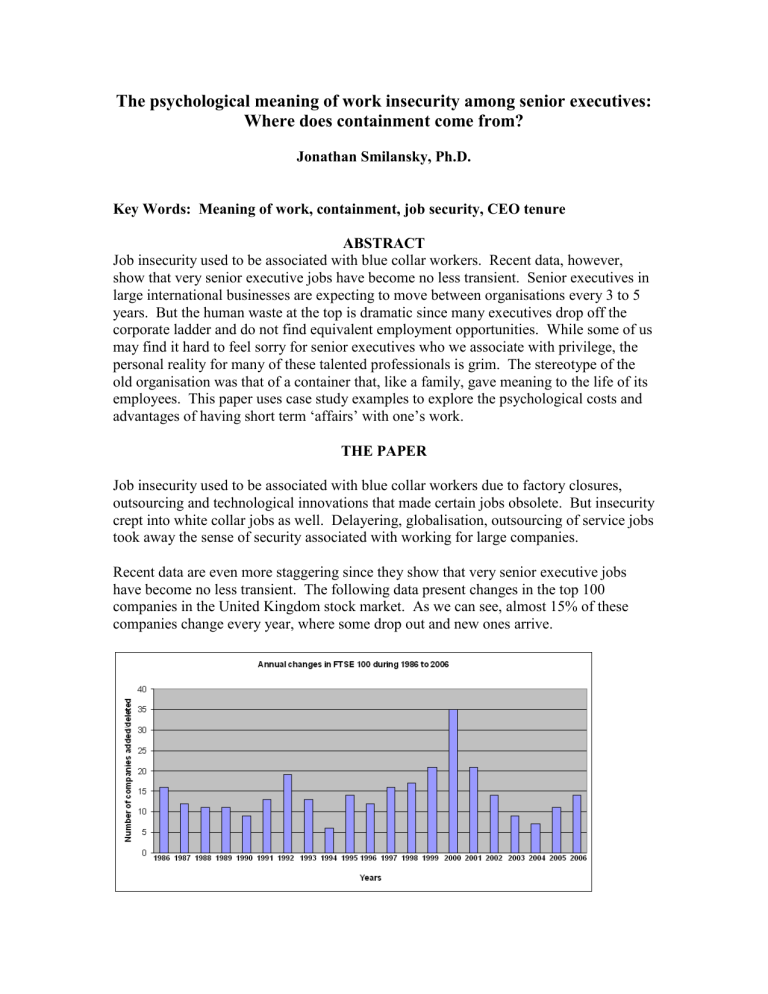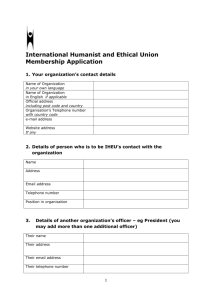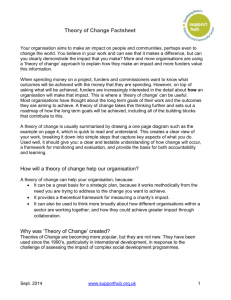The psychological meaning of work insecurity among

The psychological meaning of work insecurity among senior executives:
Where does containment come from?
Jonathan Smilansky, Ph.D.
Key Words: Meaning of work, containment, job security, CEO tenure
ABSTRACT
Job insecurity used to be associated with blue collar workers. Recent data, however, show that very senior executive jobs have become no less transient. Senior executives in large international businesses are expecting to move between organisations every 3 to 5 years. But the human waste at the top is dramatic since many executives drop off the corporate ladder and do not find equivalent employment opportunities. While some of us may find it hard to feel sorry for senior executives who we associate with privilege, the personal reality for many of these talented professionals is grim. The stereotype of the old organisation was that of a container that, like a family, gave meaning to the life of its employees. This paper uses case study examples to explore the psychological costs and advantages of having short term ‘affairs’ with one’s work.
THE PAPER
Job insecurity used to be associated with blue collar workers due to factory closures, outsourcing and technological innovations that made certain jobs obsolete. But insecurity crept into white collar jobs as well. Delayering, globalisation, outsourcing of service jobs took away the sense of security associated with working for large companies.
Recent data are even more staggering since they show that very senior executive jobs have become no less transient. The following data present changes in the top 100 companies in the United Kingdom stock market. As we can see, almost 15% of these companies change every year, where some drop out and new ones arrive.
This high rate of organisation change has a corresponding figure in terms of the tenure of
Chief Executive Officers who run these businesses, as presented in the following table:
CEO Turnover: North America
20.0
18.0
16.0
14.0
12.0
10.0
8.0
6.0
4.0
2.0
0.0
Year
US data on CEO tenure have stabilised at around 16% turnover a year, which implies that the typical CEO will not have more than 5 or 6 years in the job.
Similar data are also available for Europe where there used to be a sense of stability.
18.0
CEO Turnover: Europe
16.0
14.0
12.0
10.0
8.0
6.0
4.0
2.0
0.0
Year
As we can see, European figures that used to be around 3% in 1995 have now also stabilised at around 16% CEO turnover per year.
Senior executives in large international businesses are expecting to move between organisations every 3 to 5 years. But the human waste at the top is dramatic. The following data shows what happens to executives who lose their jobs in terms of the level of future positions that they manage to obtain.
Dropouts who disappeared from corporate radar screen
43%
The Prospering Few
Winners
4%
Board-only laterals
11%
Dropouts who joined very small firms
22%
Setbacks
3%
Other laterals
17%
Based on a study of executive turnover in the top 1,000 U.S. companies 2002-2004
These figures show that of senior executives who had to leave organisations only 4% got a better job at their next posting while 43% disappear from the corporate world altogether.
While some of us may find it hard to feel sorry for senior executives who we associate with privilege, the personal reality for these talented, ambitious, success and experienced professionals is that life has become a continuous game of musical chairs where it becomes harder and harder not to lose your seat at the top table.
Since most people (men?) spend a majority of their weekday waking hours at work than what is the psychological meaning of this inherent lack of stability and continuous real danger to one’s livelihood and sense of self worth?
The stereotype of the old organisation was that of a container that, like a family, gave meaning to the life of men (and some women) who identified with its culture and symbols and stayed within it until they got their gold watch and disappeared from site.
But do we believe in the stereotype of the ‘good old days?’ What were the psychological consequences of having ‘meaning’ be derived from belonging to a single organisation?
What are the psychological advantages of having short term ‘affairs’ with one’s work place and where do executives derive their meaning in this type of transient relationship?
The following examples, based on the author’s coaching and organisation consulting experience in a variety of corporate setting, are used to explore the new types of meaning that individuals derive in order to be contained in a transient world.
Who am I if I am not a Vice President of company X? What is the meaning of my working life if disaster looms around the corner?
Case 1: John is a senior investment manager for a large insurance company. He has worked there for many years and gradually rose to his current position of authority.
Recently, the senior management changed and the new CEO, his indirect boss, started to challenge him on a regular basis about his investment actions. John was put on notice and suffered continuous abuse in meetings. Coaching helped him to stand back a bit from the situation and to build a more supportive network of peers that helped to reduce the impact of the continuous challenge. He could not, however, entertain the idea of looking for alternative employment and preferred to stay within the highly insecure environment hoping that he will not be fired.
Case 2: Valerie was a senior executive in a division of a very large multinational company. She worked there for twenty years, moving from one part of the organisation to another as she climbed up the ranks. Recently, a new global function head was appointed and she viewed the divisional function heads, like Valerie, as old fashioned and wanted to bring in ‘new blood’. Valerie knew that she could not do anything to change this inevitable course of action and she negotiated a good exit package. There was a lot to do in the six months before she had to leave since her division was going through significant change. Despite long conversations in her coaching sessions, Valerie could not bring herself to start to look for an alternative job while she was still working her six months notice. She could not stop herself from being totally committed to her organisation until the last day even though she knew that it would be harder to find employment once she was no longer employed.
Case 3: Russell was a commercial lawyer and a Partner in a large law firm. The custom in that firm was that Partners would retire at the age of 60. When the time came, Russell had accumulated significant assets so there was no real economic concern. He bought a new sports car, worked on his golf and his friends saw how he became more and more distant until, one day, he killed himself.
Case 4: Richard had an unusual working history. Every five years or so he would move to a new organisation. Sometimes he was bored and that propelled the move, twice he was fired when his boss changed and they did not see eye to eye on things. As a result, he reported a gradual pattern where initially he was scared in a the new job since he didn’t know anyone and he wasn’t sure that he could really add value according to the expectations. A year or so into the job he started to feel on top of things and crystallised a strategy for achieving significant impact. This usually took another year or two. Once he was into year four or five he really knew what he was doing and established his
network but, instead of settling down, he started to feel restless and to look for new challenges.
Case 5: Brian was a senior sales executive responsible for all of the European sales team for an international high technology company. He had worked there for five years and prior to that did similar jobs in other high technology companies where he gradually rose from being a salesman, to managing his own team, to managing multi-country teams.
Brian was excellent in his job and a natural salesman who loved the stress and excitement of trying to get these long term deals. While successful, he also gradually gained a lot of weight and felt lonely on the long business trips. He was very close to the company CEO but at some point, as the business grew, they appointed a worldwide head of sales and
Brian had to report to him instead of directly to the CEO. Coaching could not stop him from criticising the new boss and eventually he got fired. The shock sent him to an emotional spin and he sat at home and talking bitterly with his old contacts. He started to look for new employment and, luckily, the first head-hunter that he contacted said that she would find him something only after he lost a significant amount of weight and she sent him on a crash course. The course galvanised his energy and soon he was amazed to find himself able to ride 30 miles on his bike and started to love how he looked. This sense of gaining control changed him completely and three years later he refused offers of full time employment and became an international sales consultant working with a number of start ups.
CONCLUSIONS
This paper does not focus on the degree of containment offered to individuals working in different organisations, but rather on the complex impacts of a lack of long term job security.
The concept of containment involves settings where the individual is enabled to express themselves and is taken in as who they are rather than as who they should be; thereby allowing independence and true self expression.
When the person is not enabled to discover who they are, they may be tempted to become the kind of person that is perceived to be appreciated by their environment. The security associated with this kind of external acceptance is an important part of containment but it negates the key elements of self discovery associated with the process of becoming an independent person. Therefore, this situation provides a false sense of containment by tempting the individual to fit who they appear to be to the perceived demands of their environment.
A bird that is raised in a cage will come back to its sense of security even if the door remains open, which is a form of institutionalisation. By spending one’s life as an executive in a single organisation, people become addicted to the rewards and recognition offered by it and may not develop a personal sense of what they want and need. Long
serving executives tend to become hostages to their identification with the organisation and desperate to be accepted by it as the ‘good son or daughter’, thereby twisting themselves to want what they think will be appreciated. In this respect they stop being able to differentiate between what they want and need and what they think is valued by the organisation, since the key driver becomes the need for external recognition.
This is not true of everyone who spends their working career in a single organisation since there are wide individual differences. On the other hand, executives need to identify with their organisation in order to function as leaders and master the energy and focus required for success. This encourages them to become prone to the process of false containment associated with over identification with the rewards and recognition offered by their environment.
When an executive moves from one organisation to another they may lose their sense of security and deep identification with their place of work. They are, however, ‘forced’ to develop their own sense of reward and recognition instead of using the false containment offered externally. By working for a number of different organisations, executives have the opportunity to develop their ability to explore alternatives since their inner containment is less vulnerable to the temptation of external recognition. If they subsequently lose their job they can maintain significant levels of flexibility in exploring alternative opportunities.
In retrospect, therefore, those executive who freed themselves from the grip of ‘the
Mother’ organisation, see the process of career change as a more balanced one with realistic fears about their chances to secure alternative employment coupled with the freedom to explore a broad range of alternatives that fit their needs.
While this paper is not aimed at being a ‘self help’ guide, it does suggest that we should all watch out for the process of over identifying with a single institution since the price of success may involve the acceptance of the kind of false containment described here. A series of medium term ‘employment affairs’ may be a much more containing long term experience.







